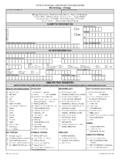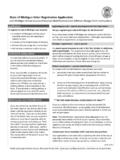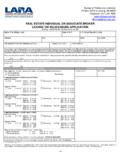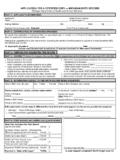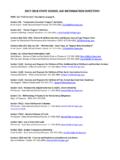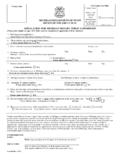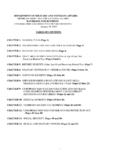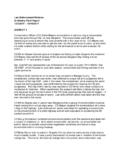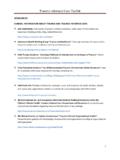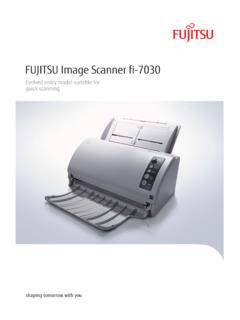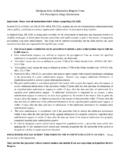Transcription of Medicaid Health Plan Common Formulary - …
1 Effective 10/1/2020 1 Michigan Department of Health and Human Services Medicaid Health Plan Common Formulary Contents Drugs Reimbursed through Fee-For-Service Benefit (Carve-Out) .. 2 Products Covered As A Medical Benefit .. 2 Medicaid Health Plans May Be Less Restrictive .. 2 Standard Prior Authorization 3 Non- Formulary Prior Authorization Requests .. 3 Michigan Pharmaceutical Product 3 Mandatory Generic Drug Policy for products whose drug class(es) are not present on the Single Preferred Drug List.. 3 Unit Dose Packaging .. 3 Non-Rebatable Drugs .. 3 Medically Accepted Indications .. 4 Vitamins and Supplements .. 4 Formulary Change Summary List .. 4 Revised 8/18/2020 Effective 10/1/2020 2 In order to streamline drug coverage policies for Medicaid and Healthy Michigan Plan members and providers, the Michigan Department of Health and Human Services (MDHHS) has created a Formulary that is Common across all contracted Medicaid Health Plans (MHPs) for the current Comprehensive Health Plan Contract.
2 The development of the Common Formulary is required under Section 1806 of Public Act 84 of 2015. Effective for dates of service on or after October 1, 2020, the Michigan Department of Health and Human Services (MDHHS) Policy Bulletin 20-51 will require Medicaid Health Plans (MHPs) to follow the Michigan PDL used by the Fee-for-Service (FFS) pharmacy program. This will be described as the Single PDL. The Michigan PDL is available on the web at >> Provider >> Michigan Preferred Drug List. Drugs not part of the Single PDL will continue to be covered in accordance with the Common Formulary Drugs Reimbursed through Fee-For-Service Benefit (Carve-Out) MDHHS contracts with capitated managed care plans to provide services for its beneficiaries. These plans are responsible for most pharmacy services. Selected drugs and classes are carved out from the managed care plan coverage and are paid directly to a pharmacy by the MDHHS fee-for service program. This list is available at For these drugs, pharmacies must bill Magellan Medicaid Administration for reimbursement.
3 Refer to the Pharmacy Claims Processing Manual at for instructions on submitting these claims. Products Covered As A Medical Benefit The Common Formulary includes drugs that are covered as a pharmacy benefit. The following are examples of products that may not be identified on the Common Formulary because a MHP may cover them as a medical benefit: Physician-administered injectable drugs Vaccines Intrauterine Devices Members and providers should work with their MHPs to determine how these products are covered. Medicaid Health Plans May Be Less Restrictive As part of the Common Formulary , minimum requirements will be established for drug utilization management policies such as quantity limits, age and gender edits, prior authorization criteria and step therapies. MHPs may be less restrictive, for products whose drug class(es) are not present on the Single Preferred Drug List, but not more restrictive, than the coverage parameters of the Common Formulary .
4 Effective 10/1/2020 3 Standard Prior Authorization Form A standard prior authorization form, FIS 2288, was created to simplify the process of requesting prior authorization for prescription drugs. The form is available at >> Forms >> Insurance. Non- Formulary Prior Authorization Requests For any drug that is not on the Common Formulary but is on the Michigan Pharmaceutical Product List (MPPL), providers can request a Non- Formulary Prior Authorization from the Health Plan. (see more below regarding MPPL). Prescribers can use the standard prior authorization form referenced above to request any non- Formulary prior authorization. Michigan Pharmaceutical Product List As a reminder, with the exception of products that are carved out, MHPs must have a process to approve provider requests for any prescribed medically appropriate product identified on the Medicaid Pharmaceutical Product List (MPPL), found at >> Providers >> Drug Information >> MPPL and Coverage Information.
5 Products that are listed on the MPPL but are not listed on the MHP Common Formulary are available for coverage consideration through a non- Formulary prior authorization process. Mandatory Generic Drug Policy for products whose drug class(es) are not present on the Single Preferred Drug List. A mandatory generic drug policy encourages the generic version to be dispensed rather than a brand-name product. In most instances, a brand-name drug for which a generic product becomes available will become non- Formulary , with the generic product covered in its place, upon release of the generic product onto the market. Mandatory generic coverage is permitted only for products whose drug class(es) are not present on the Single Preferred Drug List. Prescription generic drugs are approved by the US Food and Drug Administration for safety and effectiveness and are manufactured under the same strict standards that apply to brand-name drugs. When a generic drug is substituted for a brand-name drug, you can expect the generic to produce the same clinical effect and safety profile as the brand-name drug (therapeutic equivalence).
6 Unit Dose Packaging Products in Unit Dose packaging are not typically covered. Individual Medicaid Health Plans may be less restrictive and cover unit dose packaged products on a case by case basis. Non-Rebatable Drugs Products that do not have a Federal Medicaid rebate are not typically covered. Individual Medicaid Health Plans may be less restrictive and cover non-rebatable products on a case by case medical necessity basis. Effective 10/1/2020 4 Medically Accepted Indications Medically accepted indications will also be considered for approval. Medically accepted indications include any use of a drug which is approved under the Federal Food, Drug and Cosmetic Act, or the use of which is supported by one or more citations included or approved for inclusion in the compendia listed in Section 1927(g)(I)(B)(i) of the Social Security Act. Vitamins and Supplements Select vitamins are covered only for beneficiaries in the Children s Special Health Care Services program as indicated on the MPPL.
7 Prenatal vitamins are available for coverage for women of child-bearing age. Vitamin D, Fluoride and Folic Acid are also available for coverage for select ages and conditions. Formulary Change Summary List The Medicaid Health Plan Common Formulary will be reviewed on a quarterly basis. During these reviews new medications that are FDA-approved will be evaluated after they have been available in the marketplace for at least six months. Specific drug classes will also be reviewed at this time. MDHHS regularly monitors drug product pricing and will convene special Workgroup meetings to address significant price fluctuations. Any changes made to the Formulary as a result of these reviews will be reflected in the drug Formulary documents.
